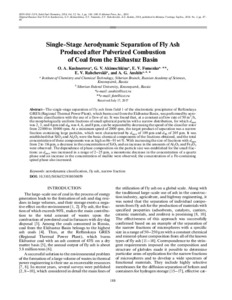Одностадийное аэродинамическое разделение золы-уноса от пылевидного сжигания угля Экибастузского бассейна
Скачать файл:
URI (для ссылок/цитирований):
https://link.springer.com/article/10.3103/S0361521918030059https://elib.sfu-kras.ru/handle/2311/111360
Автор:
Kushnerova, O. A.
Akimochkina, G. V.
Fomenko, E. V.
Rabchevskii, E. V.
Аншиц, А. Г.
Коллективный автор:
Политехнический институт
Кафедра химии
Дата:
2018Журнал:
Solid Fuel ChemistryКвартиль журнала в Scopus:
Q3Квартиль журнала в Web of Science:
Q4Библиографическое описание:
Kushnerova, O. A. Одностадийное аэродинамическое разделение золы-уноса от пылевидного сжигания угля Экибастузского бассейна [Текст] / O. A. Kushnerova, G. V. Akimochkina, E. V. Fomenko, E. V. Rabchevskii, А. Г. Аншиц // Solid Fuel Chemistry. — 2018. — Т. 52 (№ 3). — С. 188-200Текст статьи не публикуется в открытом доступе в соответствии с политикой журнала.
Аннотация:
The single-stage separation of fly ash from field 1 of the electrostatic precipitator of Reftinskaya GRES (Regional Thermal Power Plant), which burns coal from the Ekibastuz Basin, was performed by aerodynamic classification with the use of a flow of air. It was found that, at a constant airflow rate of 50 m3/h, the morphologically uniform fractions of small spherical particles with a narrow distribution, for which dmax was 2, 3, and 4 μm and d90 was 4, 6, and 8 μm, can be separated by decreasing the speed of the classifier rotor from 22000 to 10000 rpm. At a minimum speed of 2000 rpm, the target product of separation was a narrow
fraction containing large particles, which were characterized by dmax of 109 μm and d90 of 205 μm. It was established that SiO2 and Al2O3 were the basic chemical components of the fractions obtained, and the total concentration of these components was as high as 86–91 wt %. With increasing the size of fractions with dmax from 2 to 116 μm, a decrease in the concentration of SiO2 and an increase in the amounts of Al2O3 and Fe2O3 were observed. The dependence of phase composition on the particle size was established for the small fractions: as dmax was increased in a range of 2–25 μm, a monotonic decrease in the concentration of a quartz phase and an increase in the concentration of mullite were observed; the concentration of a Fe-containing spinel phase also increased.

